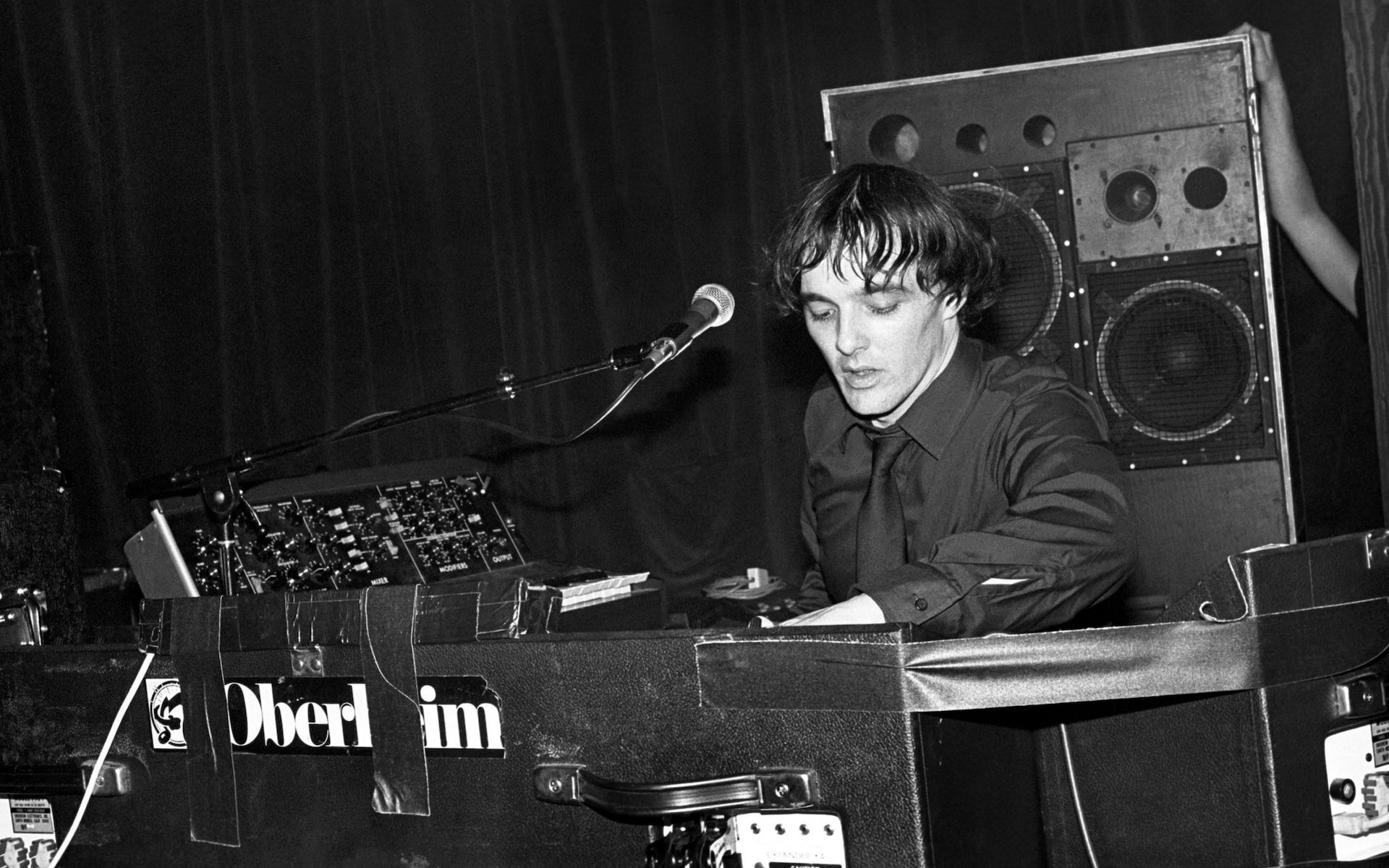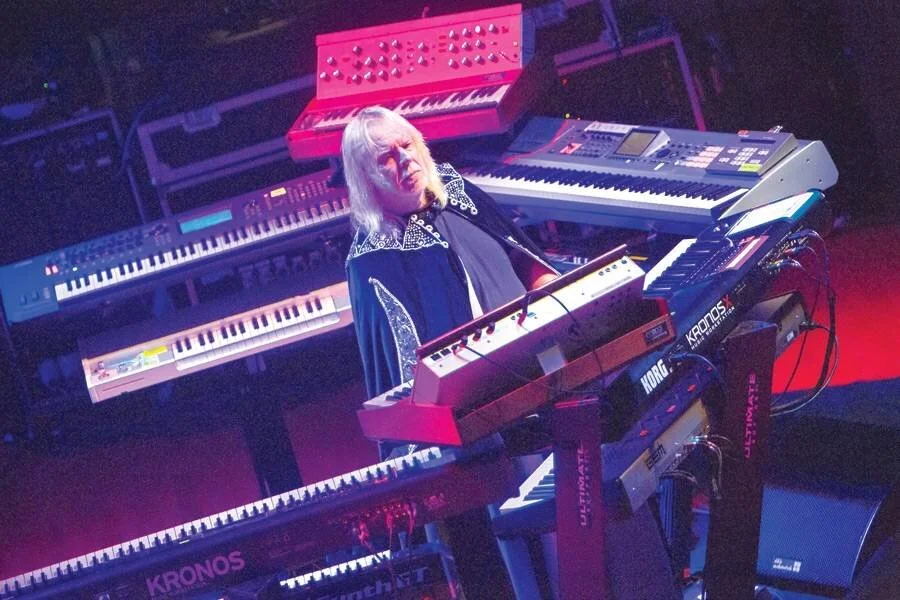By The Landlord
"I think I'm a very poor piano player." - Ray Manzarek, The Doors
"Tales From Topographic Oceans is like a woman's padded bra." – Rick Wakeman
Interviewer: "What Kraftwerk songs are you playing tonight?"
Florian Schneider: "All."
Are they the wild-eyed wizards and summoners of strange noises, swishing-haired showoffs with stacks of equipment and blurry fingers, caped purveyors of endless excess, or instead might they be the cool cats of the band, barely moving, sliding their fingers with minimum fuss to play just the right amount?
The keyboard player is often the odd member of many a group, hard to define in role and persona, the everyman or everywoman, someone who adds a variety of timbres across a range of frequencies, from thrumming and humming electric keyboard bass, or perhaps replacing the the sound of a string or horn section, to the oink, plonk, soft lilt or high squeal and pitch bend of synths and other forms of electric keyboard equipment. From chords to melodies to rhythms, they are the transition between instruments, sections and sound textures.
Herbie Hancock
Keith Emerson
Transition then, is an appropriate word for this topic. First, we're transitioning from a fortnight of quiet to something louder. But more so, this has also come up with the sad news of the passing of two keyboard greats who are especially emblematic of movement between genres. Dave Greenfield, a brilliant link between the seemingly incompatible worlds of prog rock and punk for The Stranglers, known for his fast arpeggios on instruments from Yamaha CS1x synths to the harpsichord.
And then of course, Florian Schneider, behemoth of pure electronic sound, co-founder of Kraftwerk, originator of that tie-wearing, neat-haired robot look out of a much hairier early 1970s, purveyor of minimalism and a wonderfully dry wit, co-creator of electronic pop coming out of psychedelia and prog, multi-instrumentalist, and pioneer in so many other ways its impossible to overestimate his importance to modern music.
Florian Schneider, centre, in early Kraftwerk days
Transition comes into play this week also because, as with many topics, there are overlaps that are hard to avoid. On keyboards or any other instrument, when is a solo not a riff, or vice versa? Perhaps riffs are always repeated and solos only played once in song, and between verses or choruses, but there are also many examples where that is contradicted. Yet great keyboard playing often comes not merely in that moment when the player is under the musical spotlight, but also throughout, adding rhythm, tune and texture.
And finally, transition between what instruments come into play this week. Keyboards covers a huge range. Pianos and organs have been given a good airing in the past, so perhaps let us try to concentrate synthesizers of frequency modulation or other electrified keyboards, from the Moog to the Korg or MicroKorg, for example, or various Yamaha the Roland models. But it is perhaps slightly less the sounds they create, and more so how they are played and integrated within a song, with style and context that makes a great riff or solo. So where to start?
Rock keyboard players. Nothing OTT about this …
This week's topic also traverses many genres and eras, 60s garage and soul to 70s prog, heavy rock, electronica from Kraftwerk onwards, postpunk and all kinds of pop. Dave Greenfield famously played harpsichord on Golden Brown, so perhaps there's also room for some more of that instrument too this week in songs or instruments, whether inside or outside the classical genre.
The clavichord is a relation of the harpsichord, and its electrified modern version is the clavinet, invented by Ernst Zacharias and manufactured by the Hohner company of Trossingen, in what was then West Germany from 1964 to the early 1980s. Relatively simple and portable, producing a staccato sound, it inspired a wealth of funk, jazz, rock, prog and soul in the capable hands of Stevie Wonder, Herbie Hancock, Rick Wright, Keith Emerson, John Paul Jones, Billy Preston and many others. Here is a rather wonderful sample of funky clavinet players to help inspire some suggestions.
Many great keyboard players were not only influenced by rock, but also jazz. What makes for a great playing style? It all originally emanates from the piano, and in this wonderfully erudite interview, Oscar Peterson demonstrates different styles of the various greats and how they integrate their parts into the whole.
Whatever style of riff or solo you go for, from the gentle and minimal, and now, from the sublime to the ridiculous and just to get it out of the way, could there be any more excessive than that 1980s Belgian, somewhat “overstimulated” Mario Mathy, who has performance technique that demonstrates just how style and substance can be heavily mismatched? Why have one keyboard when you could have a rack of 15? With horses? On the beach? Well, it was the 80s …
You can also see more of Mario’s excesses here.
But that's quite enough of that. So now, dear readers it's your turn for fingers to do the talking in the form of nominations in comments below. And it is also my great pleasure to place your in the more than capable hands of this week's guest guru that paragon of the perfect player, ParaMhor! Deadline for nominations is this this coming Monday at 11pm UK, for playlists published next Wednesday. No then, I really want to see those fingers ...
The emperor of excess, caped crusader Rick Wakeman
New to comment? It is quick and easy. You just need to login to Disqus once. All is explained in About/FAQs ...
Fancy a turn behind the pumps at The Song Bar? Care to choose a playlist from songs nominated and write something about it? Then feel free to contact The Song Bar here, or try the usual email address. Also please follow us social media: Song Bar Twitter, Song Bar Facebook. Song Bar YouTube. Subscribe, follow and share.
Please make any donation to help keep Song Bar running:






